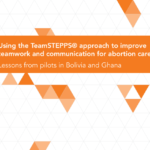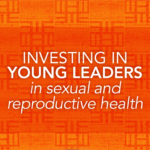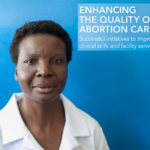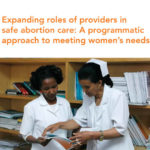
Este resumen técnico fue desarrollado para ayudar a los proveedores de servicios de primera línea y a otras partes interesadas a crear una cultura de seguridad al integrar TeamSTEPPS en la atención integral del aborto.

This technical brief was developed to help frontline service providers and other stakeholders create a safety culture when integrating TeamSTEPPS into comprehensive abortion care.

This brochure provides an overview of Ipas Ghana’s successful approach to working with young people on issues of sexual and reproductive health.
This study sought to determine the proportion of women presenting for an induced abortion in Ghana who could use a gestational wheel to determine if they had reached at least 13 weeks or fewer than 13 weeks of pregnancy accurately.
The objective of this research was to explore the context of abortion stigma in Ghana and Zambia through qualitative research, and develop a quantitative instrument to measure stigmatizing attitudes and beliefs about abortion. Focus group discussions were conducted in both countries, and a Stigmatizing Attitudes, Beliefs, and Actions scale was created. It captures three important dimensions of abortion stigma: negative stereotypes about men and women who are associated with abortion, discrimination/exclusion of women who have abortions, and fear of contagion as a result of coming into contact with a woman who has had an abortion. It provides a validated tool for measuring stigmatizing attitudes and beliefs about abortion in Ghana and Zambia and has the potential to be applicable in other country settings.

This report looks at initiatives in four countries—Nigeria, Nepal, Ghana and Zambia—where Ipas is working with governments, communities and other partners to provide clinical and programmatic support to providers and health-care facilities.
Contraception is an essential element of high-quality abortion care. However, women seeking abortion often leave health facilities without receiving contraceptive counselling or methods, increasing their risk of unintended pregnancy. This paper describes contraceptive uptake in 319,385 women seeking abortion in 2,326 public-sector health facilities in eight African and Asian countries. Ministries of Health integrated contraceptive and abortion services, with technical assistance from Ipas. Overall, postabortion contraceptive uptake was 73 percent. The findings demonstrate high contraceptive uptake when it is delivered at the time of the abortion, a wide range of contraceptive commodities is available, and ongoing monitoring of services occurs.
The stigma that often surrounds abortion and anyone associated with it—women, providers, pharmacists and advocates—contributes to abortion’s social, medical and legal marginalization. At Ipas, we know that stigmatizing abortion is inherently harmful to women’s health — preventing them from getting the care they deserve.
Understanding what factors influence the receipt of postabortion contraception can help improve comprehensive abortion care services. The abortion visit is an ideal time to reach women at the highest risk of unintended pregnancy with the most effective contraceptive methods. The objectives of this study were to estimate the relationship between the type of abortion provider (consultant physician, house officer, or midwife) and two separate outcomes: (1) the likelihood of adopting postabortion contraception; (2) postabortion contraceptors’ likelihood of receiving a long-acting and permanent versus a short-acting contraceptive method.

This brief examines the key results from expanding abortion service provision to midlevel providers in 10 Ipas country programs throughout Asia and Africa, including a global analysis of programmatic data from all 10 countries and two case studies (Ethiopia and Bangladesh).

